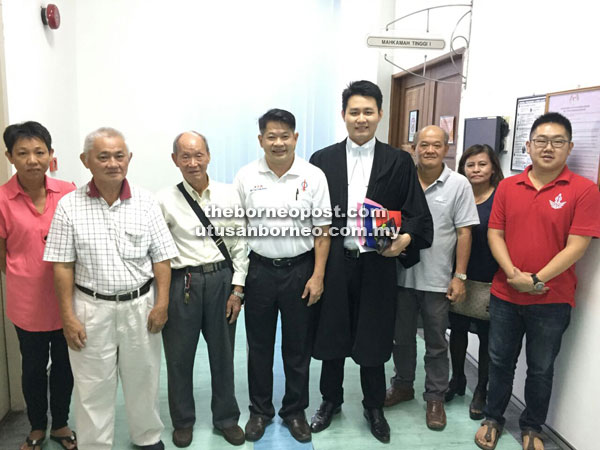
Pujut assemblyman Dr Ting (fourth left) with his counsel Ling (fifth left) outside the court room after the ruling. Others are Dr Ting’s family members and party members.
MIRI: Miri High Court yesterday quashed all three search warrants issued by the magistrate court on Sept 13 this year for police to search three places involving elected Pujut state assemblyman Dr Ting Tiong Chiong.
High Court Judicial Commissioner Dr Alwi Abdul Wahab’s decision was welcomed as justice served to the Pujut assemblyman, claimed his lawyer Alan Ling.
Ling filed the application for revision on Sept 20 to the High Court here to seek a declaration that the search warrants were unlawfully issued and not in strict accordance with the requisite law permitting the magistrate to do so. The revision application is premised on Section 323 to 327 of the Criminal Procedure Code (CPC).
“Today’s decision will serve as a landmark case for future reference by the magistrate’s court in dealing with search warrant application made by the enforcement authority, especially the police under Section 56 of the CPC,” he said.
Jotting down the grounds of the ruling read out by the Judicial Commissioner in open court, Ling said the judge had pointed out that the application was meritorious for the High Court to revise to preserve the rights of a person’s privacy and property, and to avoid abuse of power.
Judicial Commissioner Dr Alwi rightfully ruled that the search warrant should not be issued arbitrarily save in accordance with Section 56 of the CPC and upon examination of the Notes of Proceedings.
He found the applications were based on only a police report lodged by the complainant Dato’ Hii King Chiong in which a so-called Australian Voters Search List was attached, but this ‘crucial information’ was apparently absent during the search application by police on Sept 13.
The search was carried out the next day by three police teams.
The judge said in his view it was incumbent on the magistrate to take a further step in finding out from the police the ‘crucial information’ said to be attached to the police report, but not produced to the magistrate.
By not doing so, the magistrate had failed and committed an error for not making the necessary inquiry.
He said the magistrate in a case like this must exercise due care and diligence by requesting the police discharge its burden in establishing it as not mere allegation.
Ling opined that the damage done to Dr Ting’s reputation was very severe in the sense that the action to search, albeit futile, had brought shame to and, in the eyes of the public, cast negative perception on Dr Ting as a duly elected state assemblyman.
Ling, who is also state DAP secretary said he would discuss with Dr Ting and grassroots members whether to file a civil claim against the police for damages following their unlawful act on 14-9-2016.
Ling hoped that yesterday’s decision would send a clear signal and loud message across the authority, and this case would be a case law as a reference point for years to come.
“It is a judicious exercise, not automatic grant, therefore a magistrate ought to scrutinise judiciously documents and arguments and call for more information if there is doubt or refuse the application when it is deemed unnecessary.”
